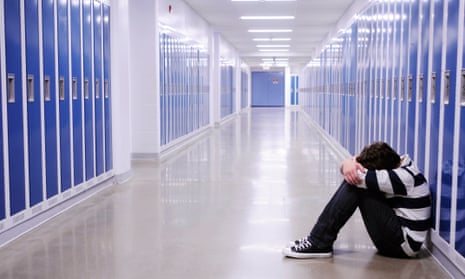Increasing numbers of children suffering from domestic abuse, serious neglect and homelessness are being refused help from over-stretched social services, schools across England have told the Observer.
Child protection cases that would automatically have prompted intervention from social workers a few years ago are now routinely being passed back to schools to deal with themselves. The inability to obtain help for children whom schools think are in urgent need is taking such an emotional toll on education staff, who say they have neither the expertise nor the resources to cope, that some schools are bringing in counsellors to prevent their safeguarding teams becoming traumatised.
Thomas Michael, deputy safeguarding lead at a secondary school in the West Midlands, said: “It’s almost at the point where the door is just shut. You know calls about children aren’t going to get anywhere and will be passed back to you.”
He described a recent initial child protection conference with a local authority in which his school was pushing for a child to be referred to social services urgently, but they were told, “let’s wait and see what happens”. “What world is this?” he said. “We have to wait until something really serious happens to that child.”
Michael is adamant that social workers are doing their best, but says after years of funding cuts they are thinly stretched and overwhelmed. Children who are already in the system are also struggling. One pupil had seven different social workers within 12 months, and each time a social worker left, their plan went back to the start “so nothing is done”, he said.
Mo Granger (not her real surname), assistant head in a secondary school in the north-west, said staff are feeling “powerless and guilty” as numerous children’s cases that would have received help a few years ago are bounced back to the school.
She said: “We finally had one child placed in foster care after trying to refer them several times over the past two years. We are often told there isn’t enough evidence, or ‘it’s not as bad as you think’.”
The police recently notified her school that they had attended a domestic violence incident at another family’s home. Social services are so over-stretched that they have not made contact with the school. The family now has nowhere to live, but the school knows that if it tries to refer them for support, it will get nowhere.
“Homelessness used to be enough for a referral, but not now. They’d tell us to just give them information on where to apply for housing – which just isn’t available here,” she said.
Susie Beresford-Wylie, director for Send, inclusion and safeguarding at the Olympus academy trust, which runs 10 schools in South Gloucestershire, said: “We’ve introduced supervision for our safeguarding teams to help them talk about what they are carrying, because they are under such pressure and so stretched. They carry this trauma with them.”
Other schools have asked her to recommend similar support for their staff. While the number of children needing help has risen considerably, the trust has had to cut family liaison and pastoral support staff because they can’t afford them.
Beresford-Wylie said that councils were now classifying many cases that would previously have passed the threshold for social care as “early help” – the stage before children’s services are involved, aiming at preventing problems becoming more serious. She said safeguarding leads in their schools said many of these cases were “way past early help”, and schools couldn’t manage without extra resources from the government.
The trust has had to introduce a triage system for early help plans, with young people joining a queue for help. “That’s just wrong,” she said.
She added: “We can’t ignore problems, or say ‘we’re full’, because we see these children every day and they need our support.”
The headteacher of a primary school with a deprived intake in a major city, who spoke to the Observer on condition of anonymity, said: “Child neglect, which we recognise from signs like poor cleanliness and nutrition, is hardly ever escalated to social services. It needs to go on for years before there is intervention.”
He said that children living with alcoholic and drug-dependent adults “are left to their own devices” and “numerous children are living in households that cause emotional abuse which aren’t classed as anywhere near the bar for intervention”.
Sallyann Sutton, professional officer at the School and Public Health Nurses Association, said school nurses, who are working across 10 to 15 schools in some areas, are spending most of their time on safeguarding issues. “We are hearing increasingly from school nurses all over England that they are identifying children with more complex situations – domestic abuse or the impacts of poverty or poor housing – but they can’t get social services to take on the referral.”
A spokesperson for the Department for Education said: “Nothing is more important than the safety of children. We are reforming the children’s social care system to better support families – prioritising earlier intervention and funding vital early help services, backed by £200m.”








